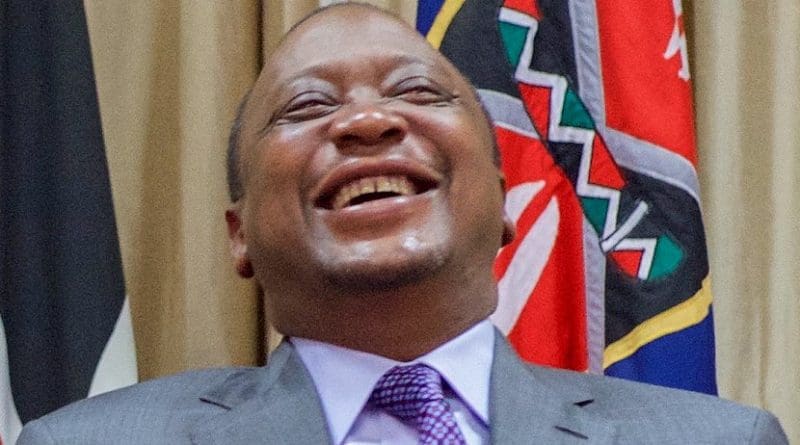A New Twist In Kenyan Politics – Analysis
By Observer Research Foundation
By H. H. S. Viswanathan
In a historic judgment for Kenya and Africa, the country’s Supreme Court annulled on September 1 the results of the August 8 presidential election in which the current incumbent Uhuru Kenyatta was declared the winner by a margin of 1.4 million votes out of around 15 million cast. This development has been hailed as a rare success for the independence of judiciary in Africa. After his defeat, the opposition candidate Raila Odinga had filed a petition with the Supreme Court alleging fraud in the polls. Four of the six judges in the bench ruled that the August election was “invalid, null and void.” Chief Justice David Maraga remarked that “taking the totality of the entire evidence, we are satisfied that the elections were not conducted in accordance to the dictates of the Constitution.” It is a serious indictment of the Independent Electoral and Boundaries Commission (IEBC).
The Supreme Court actually questioned the procedural aspects of whether the polls met the constitutional requirements. It did not go into the question of whether the irregularities made a substantial difference to the result that was announced. It is also significant that the court did not attribute any blame to President Kenyatta’s party or the campaign. The court has also ordered fresh polls to be held within 60 days.
The court verdict had an immediate effect on the economy. In a few hours, the Nairobi Stock Exchange Index fell by 4% and has continued to decline. The Kenyan Shilling has lost 3% against the US Dollar.
Tense situation
Post electoral violence is very common in Kenya. After Odinga’s defeat in the 2007 polls, ethnic violence between his Luo tribe and Kenyatta’s Kikuyu tribe led to the death of 1400 people. Cases against many political leaders for Crimes against Humanity were initiated in the International Court of Justice. Luckily, this time around, the violence was at a much lower level with the loss of only about 20 lives.
The electoral process in Africa has improved significantly in the last two decades. Governments have changed due to elections. However, it is quite normal for the defeated candidate not to concede on charges of fraud. To be fair to them, there have been instances of fraud in some cases. Post electoral violence is still a major worry for many African countries.
The new Constitution of 2010 was a game changer for Kenya. This gave more independence to the Courts which began to exercise it with enthusiasm. Odinga, after his defeat in the 2013 polls, had again moved the court for electoral fraud. However, it did not oblige him then and upheld the election.
Irregularities in the transmission of results
The court ruling says that IEBC committed irregularities in the “transmission of results.” There appears to be serious discrepancies between the figures of manual votes polled and the computer figures. Further, Kenyatta was declared winner before the scanned copies of the official tally forms were uploaded online. These factors gave Odinga enough ammunition to file the petition. To add to conspiracy theories, there was the mysterious murder of Chris Msando, the IEBC Electronic Director a few days before the Aug 8 poll. An enquiry is on but it will be sometime before the truth comes out.
The reactions to the Supreme Court ruling have been on expected lines. Odinga and his supporters welcomed the decision and celebrated. Kenyatta said “I disagree with the ruling, but I respect it.” He also asked his supporters to be calm and maintain peace.
An embarrassment for the International Monitors
International Observers have been a regular feature in most African elections. At the August 8 poll also there were International Monitors from EU, AU and the US. They had given a clean chit to the poll. They had remarked that “the ballot appeared to be free, fair and credible.” The team included former US Secretary of State John Kerry who, in fact, praised the work of the IEBC. The Supreme Court ruling must have embarrassed them a great deal. There has naturally been no reaction to the court decision from any of the monitors so far. They can, however, still argue that the procedural errors would not have changed the result.
What happens now?
The new situation raises many questions and concerns. Firstly, can the IEBC reorganize itself to conduct fresh polls which will satisfy the stringent conditions of the Supreme Court? If not, will the court intervene again? The time for organizing the new poll is very short, particularly because the full judgement has still not been made public yet. IEBC has, in the meantime, announced 17 October as the date for the fresh poll without any consultation with the opposition parties. Odinga has already rejected the date. Further, he has laid down conditions for participation like sacking of top officials of IEBC including its Chief Executive Ezra Chiloba and a full audit of the Commission’s IT systems.
Secondly, one has also to look at the cost of the exercise. For the August 8 elections, the Kenyan government had spent US $ 480 million. A similar amount has to be earmarked for the repeat poll. There are also other costs involved. Millions of Kenyans in urban areas will have to travel again to their home villages for voting.
Thirdly, will the results of the new poll satisfy the two opposing candidates? That is to say, if Kenyatta loses, will he step down? And if Odinga loses, will he concede? A lot of uncertainty seems to loom large on the Kenyan political scene. One only hopes that irrespective of what happens, there will be no major violence among the various ethnic groups.

